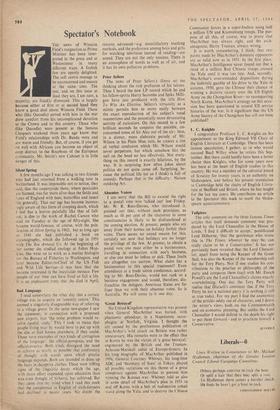Bad Language
I read somewhere the other day that a certain village was to acquire an 'amenity centre.' This seemed a singularly disagreeable way of referring to a village green. In the same newspaper I saw the statement, in connection with a proposed new airport, that 'the noise problem would re- ceive careful study.' This I took to mean that people living near by would have to put up with the din or find homes elsewhere, if they could. These were examples of two kinds of corruption of the language: the official-pompous, and the official-evasive. Both kinds disregard the heed to achieve as nearly as possible that conformity of thought with words upon which precise language depends. Both are intended to dress up the facts in deceptive clothes. These were trifling signs of the linguistic decay which the age, with more effort expended upon education than was even thought of hithertO, has achieved. But they came into my mind when I read this week that the competence in English of sixth-formers had declined in recent years. No doubt the
reasons advanced—e.g. unsatisfactory teaching methods, and the preference among boys and girls for watching television instead of reading—are sound. They are not the only reasons. There is an atmosphere of words as well as of air, and it has its own pollution problems.


































 Previous page
Previous page